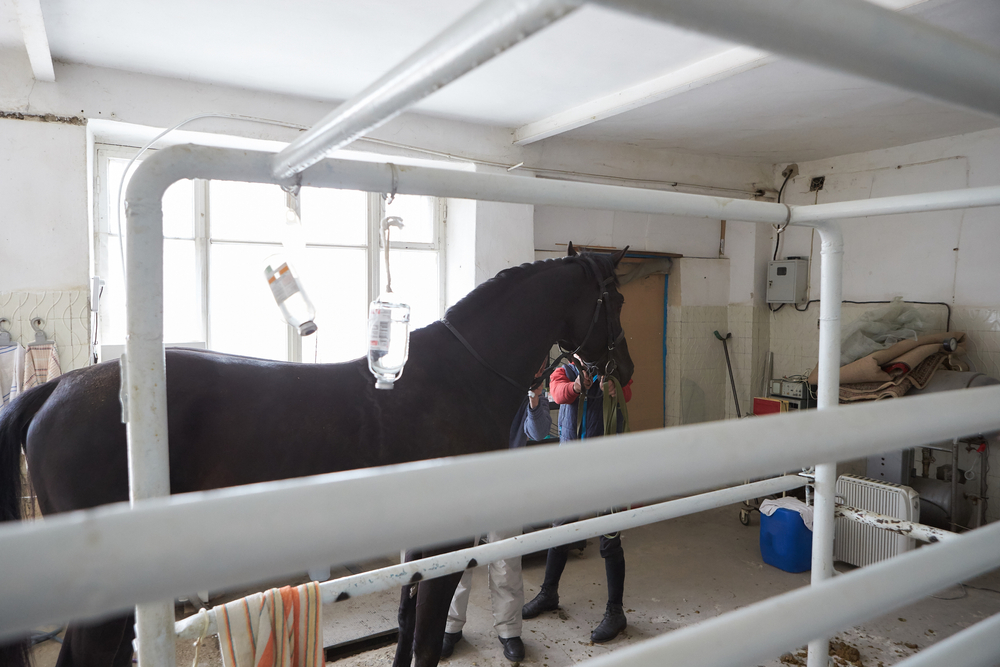
A Coggins test for horses is a blood test that screens horses for Equine Infectious Anemia (EIA), also known as Swamp Fever. It’s a serious and potentially fatal disease, so it’s important to have your horses regularly tested to ensure they are not infected. Once the equine is infected with the EIA, this virus stays for the rest of the horse’s life.
What Does Coggins Test for in Horses?
The Coggins test is used to look for the presence of antibodies to the EIA virus. If these are present, it means that the horse has been exposed to the virus and is now a carrier. However, not all horses who test positive for EIA will show symptoms of the disease.
How to Prepare Your Horse for a Coggins Test
Your horse should not have any food or water for at least four hours before the test, as this can affect the results.
Frequently Asked Questions
How is a Coggins Test Performed?
A Coggins test for horses is a simple blood test that takes only a few minutes to perform. A small sample of the horse’s blood is taken from the horse’s neck and sent to a laboratory for analysis.
Who Can Perform a Coggins Test for Horses?
Only a licensed USDA veterinarian must perform such a blood test.
How Much Does a Coggins Test Cost?
The cost of a Coggins test varies depending on where you live, but typically it costs between $30 and $50. Some states require all horses to be tested annually, while others only require testing every two years. Check with your state’s department of agriculture to find out the Coggins test requirements in your area.

What Are the Benefits of the Coggins Test?
The Coggins test is an important tool for preventing the spread of equine infectious anemia. By testing equines before they are moved or come into contact with other horses, the test can help prevent the spread of the EIAV disease.
What Does a Coggins Test Show?
A Coggins test looks for antibodies to equine infectious anemia virus (EIAV). This virus is spread by blood-sucking insects, such as horseflies and mosquitoes. The virus can also be transmitted through contaminated needles or other equipment that comes into contact with infected blood. Horses with EIAV typically develop a fever and may show other signs of illness, such as weight loss and lethargy. In some cases, this horse disease can be fatal. There is no cure for EIAV, so it’s important to take steps to prevent its spread.
How Often Should Horses Be Tested?
It is recommended that all horses be tested annually for EIA. If you are buying or selling a horse, you will need to have a current Coggins test before the transaction can be completed.
Why Is It Called a Coggins Test?
The test is named for Dr. Leroy Coggins, who developed the test in the 1970s.
What Are the Limitations of the Coggins Test?
The Coggins test can only detect antibodies to EIAV. This means that it cannot be used to diagnose other diseases, such as West Nile virus or Lyme disease. In addition, the Coggins test can only be performed on live horses – it cannot be used to test horse tissue or products (such as leather).
What Is Equine Infectious Anemia?
Equine infectious anemia is a severe viral disease that affects horses, donkeys, and mules. The virus is transmitted through contact with infected blood and can cause severe illness or death in affected animals.
How to Prevent Spreading the Equine Infectious Anemia?
There is no cure for equine infectious anemia, so the best way to prevent its spread is through testing and quarantine of infected equines.
Conclusion
The Coggins test for horses is a blood test that can be performed by an accredited veterinarian. It is essential to test all your equines before they are sold or come into contact with other animals. If you have any concerns about the Coggins test or how to prevent the spread of EIA, please contact your veterinarian.
